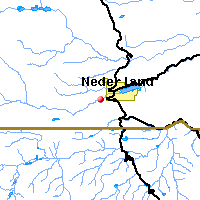|
|

|
BASIN-USGS-COB Boulder Creek Millenium Baseline |
|
Boulder Creek Watershed
Total Alkalinity Data for 2000 - Middle Boulder Creek at PSCo Weir |
Preliminary Data - subject to revision
|
|
|
|
Information on Total Alkalinity:
Alkalinity
refers to how well a water body can neutralize acids. Alkalinity measures the amount of alkaline compounds in water, such as carbonates (CO3 2-), bicarbonates (HCO3 -), and hydroxides (OH-). These compounds are natural buffers that can remove excess hydrogen ions that have been added from sources such as acid rain or acid mine drainage. Alkalinity mitigates or relieves metals toxicity by using available HCO3 - and CO3 2- to take metals out of solution, thus making it unavailable to fish. Alkalinity is affected by the geology of the watershed; watersheds containing limestone will have a higher alkalinity than watersheds where granite is predominant. The Boulder Creek Watershed is composed primarily of granite rocks, thus the water has a lower alkalinity content. |
|
More general information about Total Alkalinity
|
|
|
Interpretation of Boulder Creek Total Alkalinity data
|
|
|
|
Monitoring site information: |

|
- Location: Middle Boulder Creek at PSCo Weir
- Name: MBCaW
- Type: Composite
- Frequency: SemiAnnual
- Longitude: 105 ° W 30'
- Latitude: 39 ° N 57'
- Elevation: 8185 feet asl
- Site photo
|
|
| Downstream Site: Middle Boulder Creek @ Nederland WTP |
| Upstream Site: North Boulder Creek diversion to Lakewood |
|
| Date |
Alk
mg/L as CaCO3 |
| June, 2000 |
8.3 |
| October, 2000 |
17.0 |
| *value below detection limit: |
|---|
| Detection Limit (if available) |
1.0 |
|---|
|
Preliminary Data - subject to revision
|
|
Select on the parameter name to view all Total Alkalinity time series plots on the basin map.
Select on the table date to view stream Total Alkalinity profiles observed on that date.
Select here to view all parameters at this site.
|
|
|
INVITATION
BASIN is a community project actively seeking public participation. We
appreciate all feedback and welcome comments, suggestions and contributions.
To find out more about how you can be involved, click here.
|
|
| BASIN is funded through the US EPA EMPACT Program | |
|
Home
| Site Map
| Glossary
| Bibliography
| Contributors
About BASIN
| Attribution
| Feedback
| Search
|

